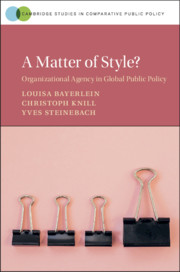Book contents
- A Matter of Style?
- Cambridge Studies in Comparative Public Policy
- A Matter of Style?
- Copyright page
- Dedication
- Contents
- Tables and Figures
- Preface
- Abbreviations
- 1 Introduction
- 2 Conceptualizing and Explaining Bureaucratic Influence: Administrative Styles
- 3 Observing and Explaining Administrative Styles: From Concept to Empirical Analysis
- 4 The IMF and the UNHCR
- 5 The IOM and the FAO as Consolidators: Struggles of the Challenger and the Challenged
- 6 Advocacy at UNEP and the WHO: How Expertise and Common Beliefs Shape an Administrative Style
- 7 NATO and the ILO as Servants: the Dedicated Steward and the Saturated Dinosaur
- 8 Conclusion
- References
- Index
7 - NATO and the ILO as Servants: the Dedicated Steward and the Saturated Dinosaur
Published online by Cambridge University Press: 04 July 2020
- A Matter of Style?
- Cambridge Studies in Comparative Public Policy
- A Matter of Style?
- Copyright page
- Dedication
- Contents
- Tables and Figures
- Preface
- Abbreviations
- 1 Introduction
- 2 Conceptualizing and Explaining Bureaucratic Influence: Administrative Styles
- 3 Observing and Explaining Administrative Styles: From Concept to Empirical Analysis
- 4 The IMF and the UNHCR
- 5 The IOM and the FAO as Consolidators: Struggles of the Challenger and the Challenged
- 6 Advocacy at UNEP and the WHO: How Expertise and Common Beliefs Shape an Administrative Style
- 7 NATO and the ILO as Servants: the Dedicated Steward and the Saturated Dinosaur
- 8 Conclusion
- References
- Index
Summary
In this chapter, the comparison of the NATO and the ILO reveals similar administrative styles despite them having almost nothing in common in structural terms. While NATO’s servant style is not particularly astounding, given its policy area, mandate, and functional design, the ILO’s case is puzzling. Despite it being an organization with rather broad autonomy, (normative) authority, and high legitimacy, the ILO’s IPA regularly behaves very passively when it comes to putting its own stance on the IO’s outputs. We show that their similar servant styles can traced back high internal challenges and to the perception of not particularly pronounced external pressures. In conjunction, the constraints arising from the former and the sense of security stemming from the latter render more entrepreneurial behaviour neither possible nor necessary.
- Type
- Chapter
- Information
- A Matter of Style?Organizational Agency in Global Public Policy, pp. 158 - 189Publisher: Cambridge University PressPrint publication year: 2020

